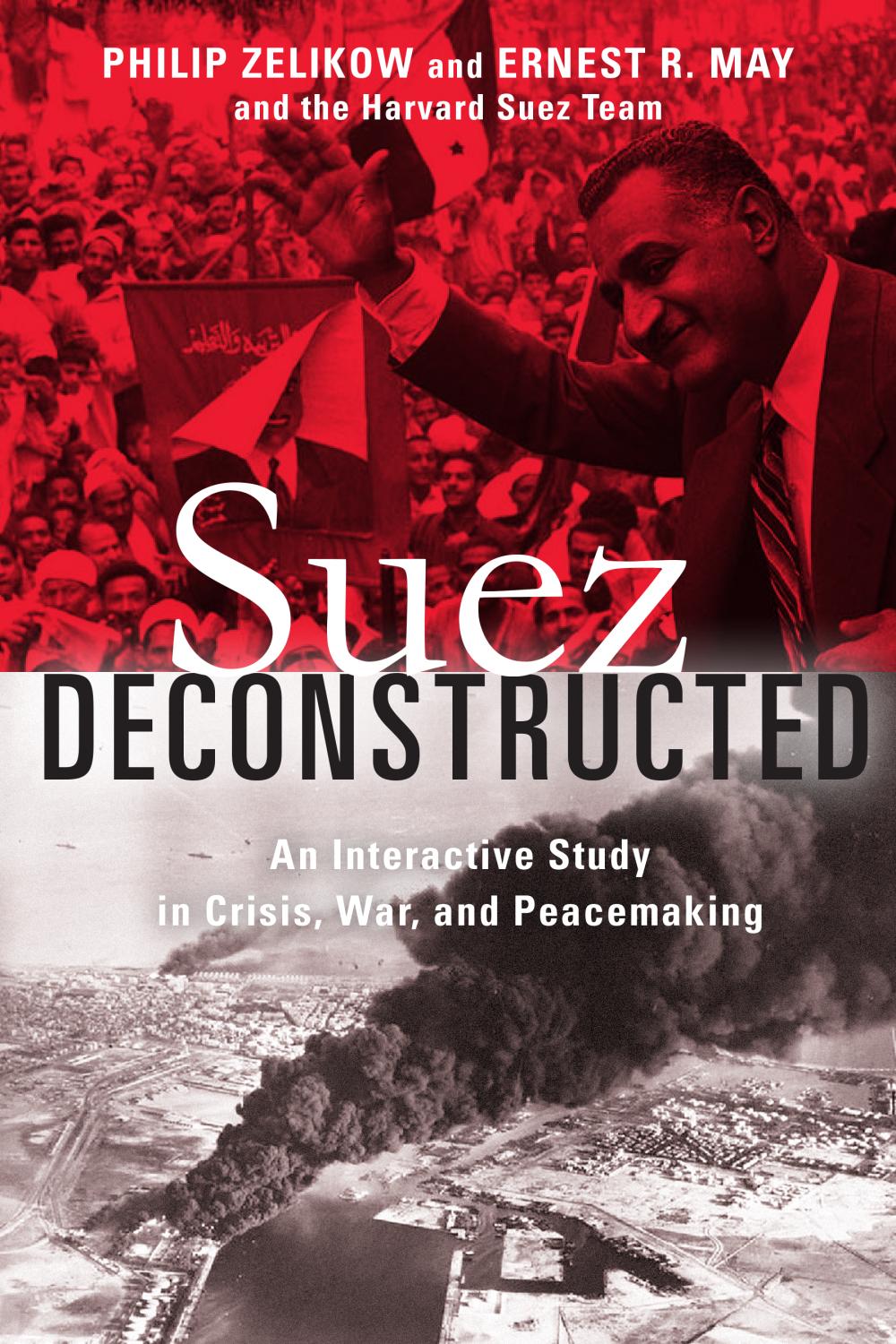Suez Deconstructed An Interactive Study in Crisis, War, and Peacemaking
Experiencing a major crisis from different viewpoints, step by step
The Suez crisis of 1956—now little more than dim history for many people—offers a master class in statecraft. It was a potentially explosive Middle East confrontation capped by a surprise move that reshaped the region for years to come. It was a diplomatic crisis that riveted the world’s attention. And it was a short but startling war that ended in unexpected ways for every country involved.
Six countries, including two superpowers, had major roles, but each saw the situation differently. From one stage to the next, it could be hard to tell which state was really driving the action. As in any good ensemble, all the actors had pivotal parts to play.
Like an illustration that uses an exploded view of an object to show how it works, this book uses an unprecedented design to deconstruct the Suez crisis. The story is broken down into three distinct phases. In each phase, the reader sees the issues as they were perceived by each country involved, taking into account different types of information and diverse characteristics of each leader and that leader’s unique perspectives. Then, after each phase has been laid out, editorial observations invite the reader to consider the interplay.
Developed by an unusual group of veteran policy practitioners and historians working as a team, Suez Deconstructed is not just a fresh way to understand the history of a major world crisis. Whether one’s primary interest is statecraft or history, this study provides a fascinating step-by-step experience, repeatedly shifting from one viewpoint to another. At each stage, readers can gain rare experience in the way these very human leaders sized up their situations, defined and redefined their problems, improvised diplomatic or military solutions, sought ways to influence each other, and tried to change the course of history.
Praise for Suez Deconstructed
“Statecraft is not only about impersonal forces—it’s about intangibles. The Suez crisis is an ideal history from which to glean that understanding, and Suez Deconstructed gives readers an enlightening and engrossing opportunity to gain it before facing a crisis of their own.”
—Jordan Chandler Hirsch, Texas National Security Review
“This is a thorough, well-written study of the 1956 Suez Crisis, authored in large part by Zelikow (Univ. of Virginia) but with chapters by five other capable scholars. May (Harvard until his death in 2009) earned co-authorship of the book by virtue of involvement in the research project as far back as the 1990s. . . . The authors use existing literature and some archival research to produce the best study so far of the crisis. With its vivid insight into the international politics of this period (and the domestic politics of key countries), Suez Deconstructed will interest many historians, political scientists, policy makers, and sophisticated general readers. Essential.”
—CHOICE
“This groundbreaking book revisits the Suez crisis from the perspective of key decision makers in the major capitals. Beyond providing a rich history of a consequential crisis, the book perfectly captures the games that governments were playing, revealing just how much each move reflected an understanding or misunderstanding of how others might respond. This is a valuable contribution to foreign policy analysis and an extraordinary tool for teaching statecraft.”
—Jeremy Weinstein, professor of political science and senior fellow at the Freeman Spogli Institute, Stanford University; former official at the White House and the U.S. delegation to the United Nations
“The Suez Crisis was a critical and controversial turning point in postwar history, where the global forces of the Cold War, empire, and nationalism collided. Masterfully exploring the perspectives of policymakers from six different capitals, this innovative volume provides new insight into the diplomacy and politics of this complex affair. Clearly written, engaging, and based on deep research in primary and secondary sources, Suez Deconstructed is not only a work of cutting-edge scholarship; it is an ideal teaching tool to help future decision makers understand the complex realities of statecraft and strategy.”
—Francis J. Gavin, Giovanni Agnelli Distinguished Professor and director of the Henry A. Kissinger Center for Global Affairs, Johns Hopkins School of Advanced International Studies
“Suez Deconstructed provides a unique opportunity for scholars and students of international relations to peer into the minds of key decision makers as they grappled with one of the most complex and consequential crises of the Cold War. Richly rooted in historical detail, this book offers enduring lessons for current and future policymakers, both in the United States and around the world, about what makes for successful diplomacy.”
—James Steinberg, University Professor, Social Science, International Relations and Law, Syracuse University and former U.S. deputy secretary of state
Philip Zelikow, the White Burkett Miller Professor of History at the University of Virginia, taught at Harvard University during most of the 1990s. He has experience with high-level statecraft in each of the five administrations from Reagan through Obama, working in various capacities at the State Department, White House, and the Defense Department. He was also the executive director of the 9/11 Commission.
Ernest May was the Charles Warren Professor of History at Harvard University, where he also directed the Charles Warren Center for Studies in American History. A Navy veteran, he taught about international history for more than fifty years before his death in 2009.
Media Coverage
Book Review Roundtable: What to Make of the Suez Canal Crisis
Suez deconstructed: an interactive study in crisis, war, and peacemaking
Suez deconstructed: an interactive study in crisis, war, and peacemaking

